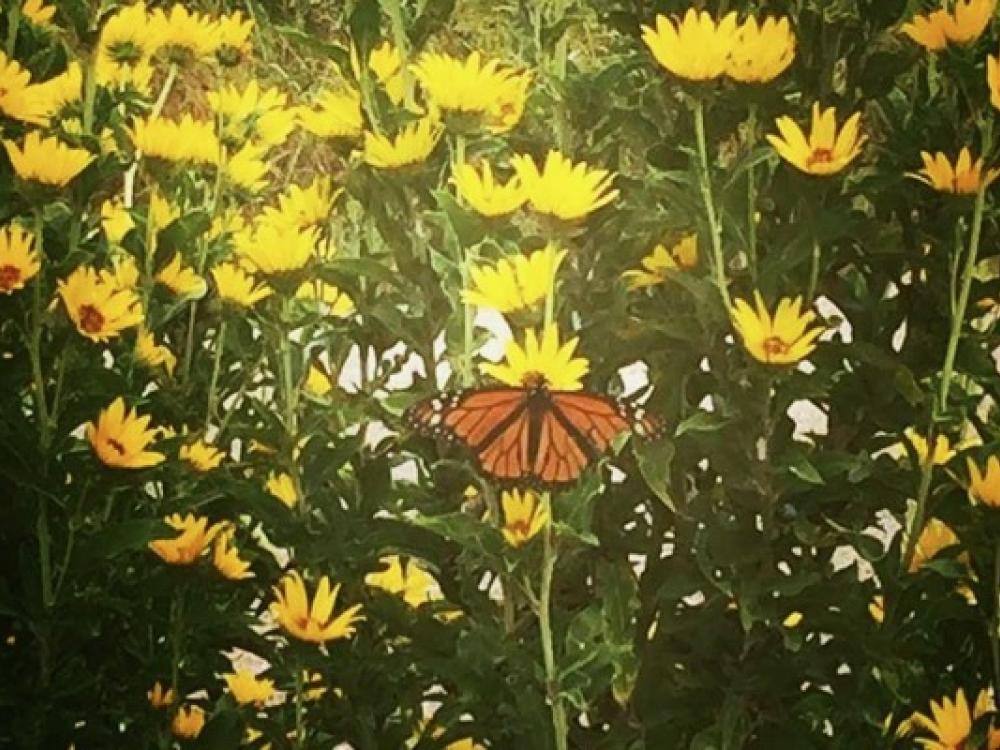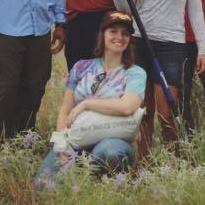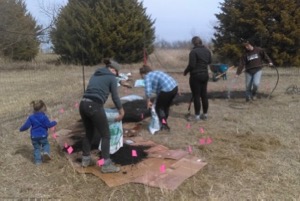
STEAMGrown Gardens was created last fall to support monarch migration while serving underfunded elementary schools in Denton. Photo courtesy of Rachel Weaver.
June 15, 2018
A Denton-based nonprofit wants to make it easy for schools to teach children about saving monarchs while sticking to state-mandated curriculum.
 Jen Bailey is the driver behind STEAMGrown Gardens, a nonprofit launched last fall in Denton to establish monarch butterfly habitats at underfunded elementary school campuses. The program provides accompanying state-mandated Texas Essential Knowledge and Skills STEAM - Science, Technology, Engineering, Art, Mathematics - curriculum while helping kids develop an appreciation for the natural world.
Jen Bailey is the driver behind STEAMGrown Gardens, a nonprofit launched last fall in Denton to establish monarch butterfly habitats at underfunded elementary school campuses. The program provides accompanying state-mandated Texas Essential Knowledge and Skills STEAM - Science, Technology, Engineering, Art, Mathematics - curriculum while helping kids develop an appreciation for the natural world.
Jen Bailey, founder of STEAMGrown Gardens in Denton. Courtesy of Facebook.
Partnering with teachers and volunteers, the nonprofit applies for grants and fundraises to pay for expenses, purchases plants along with all other necessary materials, and installs the gardens at qualifying elementary schools throughout the Denton Independent School District.
Bailey, who holds a bachelors in biology and a masters in environmental geography from UNT, currently works as a field scientist for an environmental consulting firm. She started the program because she saw three things that needed help: struggling monarchs, struggling students and struggling schools.
“Even though we know the monarch populations have decreased up to 90 percent over the past two decades, it’s hard to point to anything substantial that has been done here in North Texas to help,” Bailey says.“Though their yearly concentration over Dallas is a key aspect of North Texas culture, little has been done to locate and protect prairies and pastures where milkweed thrives. It all goes under the boot of development.”
Bailey said at the same time, 60 percent of Texas students attend underfunded districts which struggle to meet minimum standardized test requirements, much less organize field trips in nature. Many underfunded districts are categorized as Title 1, meaning the majority of their students qualify for the federal free lunch program. These schools are often caught in cycles of underfunding, resulting in underperformance feeding back into underfunding.
“Many teachers at these schools want to, or have tried, to start gardens, but struggle with funding and time. Not only did we want to provide them access to funds, plants and labor, we wanted to answer the questions, ‘How do we ensure the garden has resilience from year to year? How do we create the need of the school for the garden?’ That’s when we came up with the idea for TEKS-based STEAM curriculum. By providing premade lessons to busy teachers, we give them a beautiful tool to link the garden back to classroom learning, thus making their time more effective,” Bailey says.
HELPING MONARCHS, HELPING KIDS
 STEAMGrown Gardens, says Bailey, is far more than a resource for teachers to get help with developing classroom curriculum. She wants the program to create thriving wildflower gardens throughout the monarch butterfly’s migration route from Mexico to Canada and up through North Texas.
STEAMGrown Gardens, says Bailey, is far more than a resource for teachers to get help with developing classroom curriculum. She wants the program to create thriving wildflower gardens throughout the monarch butterfly’s migration route from Mexico to Canada and up through North Texas.
STEAMGrown members work to prepare the prototype garden at Clear Creek Natural Heritage Center.
Prominent in each garden are native milkweed plants. As the host plant for monarch butterfly caterpillars, it’s the only plant the monarch larva can feed on while they grow up into adult butterflies.
“Once a garden has been created, we hope to cultivate local networks of native plant enthusiasts, environmentalists, community volunteers and scientists to work with teachers and students to care for the garden in a collaborative effort to provide safe haven to monarchs and enriching outdoor learning to students,” Bailey says.
She also sees STEAMGrown Gardens creating a new generation of young people who are wholly impressed with the natural world around them and therefore motivated to protect what they’ve come to value.
“There’s a reason we don’t just provide lessons about monarchs to teachers and landscaping plants for the school flower bed and call it a day, and that reason is the power of outdoor learning,” Bailey says. “We’re turning the monarch garden into a powerful learning tool to teach science math, art, even engineering in the hopes it can positively impact test scores.
“We’re also hoping to make a positive impact on the human spirit. We live in boxes, we stare at boxes. But the human mind evolved outside. Every one of us has a brain built to find and learn the connections between members of our ecosystem, a way of knowing called, ecological knowledge. The elementary school students of today will need to rely on ecological knowledge to solve problems of the future. What better place to start than a garden?”
Bailey said aside from the obvious benefits of boosting test scores and fulfilling the deep need for outdoor time, students come alive when they see a mistflower completely covered in huge orange butterflies.
“Bringing an amazing phenomenon like the monarch migration right to a student’s elementary school creates connections across multiple dimensions for them. They’re suddenly connected to Mexico, New England, Canada - the destinations of the monarchs. They’re connected in time to the great grand parents of the butterfly before them that passed this way last year. They’re connected in understanding by observing the relationship the insects have with certain plants and not others. And this is all the beginning of ecological knowledge.”
THE PLOTS THICKEN
Already, STEAMGrown Gardens is working with Rivera Elementary in Denton to set up a garden and develop curriculum. The program has also begun building a prototype garden at Clear Creek Natural Heritage Center, receiving several plants and a donation from the Trinity Forks Native Plant Society of Texas to get the job done.
“This prototype garden will serve as a sort of tester garden to try out different curriculum and plants. Field trips often come through to see the heirloom vegetable garden right next to it, managed by Rachel Weaver, active STEAMgrown Board member and wearer of many hats,” Bailey adds.
School gardens have cropped up throughout North Texas in recent years, but Bailey says all too often, those gardens suffer neglect over the summer break or are wholly decommissioned when funding dries up or when the staff member who implemented the garden is reassigned to another school or moves away.
Bailey says STEAMGrown Gardens will bring continuity to school gardens so they can be maintained more efficiently and keep their value as a teaching tool, all at no cost to the school.
“Our basic garden plan comes with a rain barrel and a shade and water-collecting structure,” Bailey says.
“We raise the money and write the grants on behalf of busy school teachers who have way too much on their plate to initiate and maintain a garden. We have collected donations in person, and applied to grants with the Monarch Lab, Monarch Watch and Trinity Forks Native Plant Society who graciously donated some plants and materials money. Gracious individuals have also helped us with native seeds to rear.”
WINGING IT
Although not a teacher herself, Bailey says she married into a family of teachers. Her credentials come from her work in education for the University of North Texas, the Dallas Arboretum and the nonprofit Big Thought. She also wrote the environmental science field trip curriculum for Klyde Warren Park in Dallas.
Establishing monarch habitat gardens in the Denton school district is only the beginning for Bailey as she develops STEAMGrown Gardens. Once she works out the kinks and gets a few gardens under her belt, she says she’s taking the program to schools in Fort Worth, Dallas and beyond. In time, she hopes to see the effort add numbers back to the monarch butterfly population by ensuring that there’s an ample supply of milkweed plants each spring for monarch caterpillars to fatten up on.
“We can’t just demand development halt so butterflies can find their milkweed,” Bailey says. “We have to find spaces for our ecosystems to keep functioning in and around the patchworks of our human-dominated landscapes. Our gardens have multiple functions, as habitat, teaching tool and gateway to the community. We think this pairing can develop into a healthy symbiotic relationship.”
Christina Beck, environmental science teacher and STEAMgrown Gardens secretary, hopes the program shows children how they are not altogether separate from the natural ecosystem and that they can change things for the better.
“Students need to be given an opportunity to see the positive impact they can make by doing something small,” Beck says.
Stay up to date on everything green in North Texas, including the latest news and events! Sign up for the weekly Green Source DFW Newsletter! Follow us on Facebook and Twitter.









